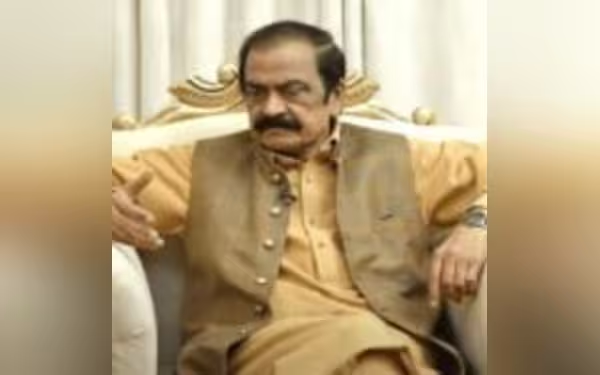Saturday, November 16, 2024 05:44 PM
Imran Khan's Political Future in Jeopardy Amidst PTI Challenges
- Sanaullah questions Imran Khan's political decisions.
- PTI urged to engage in constructive political dialogue.
- Gandapur's political recovery remains uncertain.
 Image Credits: pakistantoday
Image Credits: pakistantodayRana Sanaullah highlights the uncertain political future of Imran Khan and PTI, emphasizing the need for dialogue and accountability.
MULTAN: The political landscape in Pakistan is currently witnessing significant turbulence, particularly for the Pakistan Tehreek-e-Insaf (PTI) party and its leader, Imran Khan. Federal Adviser on Political Affairs, Rana Sanaullah, has recently expressed concerns regarding the uncertain political future of both Khan and PTI. This uncertainty stems from a series of challenges that the party is facing, which Sanaullah attributes largely to the decisions made by Khan himself.
Sanaullah, a senior figure in the Pakistan Muslim League-Nawaz (PML-N), emphasized the necessity for PTI to engage in political dialogue to navigate its current difficulties. He pointed out that the resolution of Pakistan's political issues can only be achieved through constructive discussions among political entities. According to him, the current leadership of the establishment is neutral and does not favor any particular political figure. This neutrality implies that PTI must seek political solutions independently, rather than relying on external support.
In his remarks, Sanaullah also highlighted Khan's ongoing legal challenges, including his involvement in a high-profile case concerning £190 million. He expressed confidence that Khan would ultimately be held accountable for his actions, stating, "Imran Khan is his own enemy." This statement suggests that Khan's own decisions have contributed significantly to his current situation.
Interestingly, Sanaullah noted that some members of PTI have been reaching out to other political leaders, such as Mehmood Achakzai and Maulana Fazlur Rehman. This indicates a potential for political reconciliation, which Sanaullah believes is crucial for addressing the political problems facing the country. He stressed that discussions based on mutual understanding are far more beneficial than conflict.
Furthermore, Sanaullah criticized PTI's historical role in political maneuvering, particularly during the 26th Constitutional Amendment. He urged the party to take responsibility for its actions that have shaped the current political environment. He argued that PTI members, who once facilitated certain political strategies, should now recognize their influence on the nation’s political reality and commit to the political process.
When questioned about the political future of PTI leader Ali Amin Gandapur, Sanaullah expressed doubt regarding his ability to recover politically. He remarked on Gandapur's recent actions, which he described as inconsistent, and questioned whether Gandapur could regain his footing in the political arena. Referring to Gandapur’s attempts to appeal to both PTI leadership and the establishment, Sanaullah stated, "Gandapur may recover on his own, but it plays both ways." He cited Gandapur's recent efforts to sway political outcomes at D-Chowk as indicative of a lack of clear political direction.
The political future of Imran Khan and PTI remains precarious. As the party grapples with internal and external challenges, the call for dialogue and accountability becomes increasingly vital. The political dynamics in Pakistan are ever-changing, and it is essential for PTI to adapt and engage constructively with other political forces to secure its place in the future of the nation. The road ahead may be fraught with difficulties, but through open communication and a willingness to learn from past mistakes, there is hope for a more stable political environment.













